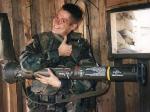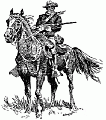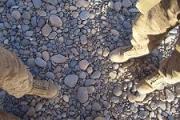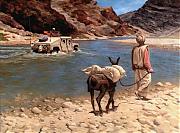How will OIF be remembered - from which parts will we draw lessons available? What was John Ford trying to tell us when Jimmy Stewart admits to not having killed Lee Marvin in The Man Who Shot Liberty Valance?
I have some concern that when OIF is reviewed we will pick and choose what we want to learn out of it. If we were doing a review right now what would we lay out as the top 5 or so takeaways and how would that effect change? I'm a bit concerned that as a military we might go for the low hanging fruit instead of really being introspective and looking forward with regards not only to our own war, but the other wars going on around us, and how potential adversaries might be eyeballing us and their neighbors.
Do we simplify things through aggregation of events to get our arms around it -a kind of historical compression - where important bits get crushed in order to make the larger event fit the place we assign it? Do we linearize historical events to a point where they are seen only in relation to previous and subsequent events and as such lose important context, or are discarded as irrelevant? We have to be real careful not to do this.
At certain points in OIF you'll find some serious fights where the nature of war became reasonably unbridled and pure for the combatants, even if outside of that it was more tethered to its political context. This not only happened during the invasion, but in Ramadi, Fallujah, Baghdad, Mosul and several other places between the invasion and up to 2007. We still consider there is a possibility of large scale fights that might happen as a result of JAM, folks lying low until we start to withdraw BCTs or if events exterior to OIF should occur - we have to in order to lessen the chance of being surprised. We should not write those fights off as anomalies - nor should we cite them as the norm. Maybe its just the way chance and probability are going to play out to scale given the stakes of interested parties. What appears of tactical consequence to us, might be perceived as strategic to somebody else - and their reaction might be as well.
Consider what it takes to deploy and sustain a large military force of air, sea and ground components capable of doing what we did in the initial phase of OIF - too many times I think policy folks (and even ourselves) don't understand or forget the mechanisms involved in that task until we actually have to do it. As such we often lack an appreciation for the overhead required to adjust to the friction of doing these big muscle movements with all the supporting ones that make it possible.






 )as well as seeking to understand each other's ideas.
)as well as seeking to understand each other's ideas.











Bookmarks